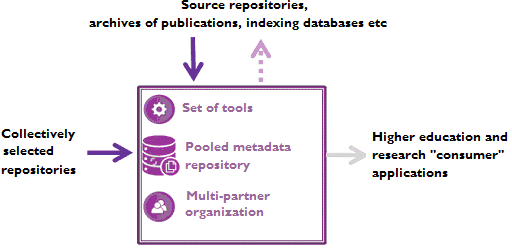CONDITOR
It is constructed according to the principle of pooling services to avoid duplicate entries of data concerning French research production.
Why Conditor?
There are a multitude of repositories in which the scientific production of individuals, teams, laboratories or institutions is recorded. These include the national HAL archive, open archives and institutional bibliometric databases, the Science and Technology Observatory’s (Iperu) system which produces national indicators, indexing databases and international archives. However, none of these repositories provides a complete overview of the production of French higher education and research institutions and laboratories.
What Conditor isn’t
The idea is not to set up a new archive of publications and there is no full text storage. Neither is the aim to replace research information systems like Caplab, or to set up a portal for access to bibliographical references (ScanR will be a means of “seeing” Conditor’s content). Finally, Conditor is not intended to replace systems which produce science indicators or to correct metadata directly at the source.
What IS Conditor?
Conditor is:
- a “pooled” repository of quality metadata from French higher education and research or international sources based on the National Repertoire of Research Structures (RNSR) and other repositories selected collectively;
- an adapted “set of tools” used to build this repository (collection, reformatting, detection of duplicates, enrichment via repositories, etc.);
- a network of information professionals working on data qualification (checking, alerts leading to sources, etc.);
- APIs which enable higher education and research applications to retrieve metadata.
Who collaborated on the Conditor project?
After an experimentation phase that served as a proof of concept, the project phase was launched in December 2016 with the support of the Higher Education, Research and Innovation Ministry and involves numerous partners:
- research organizations: CNRS, Inra, Inria, IRD, Irstea,
- universities: Angers, Bordeaux, Grenoble, Lorraine, Montpellier, Nice, Paris Dauphine, Paris Diderot, Sorbonne University, Strasbourg,
- French higher education and research operators and organizations: Abes, Amue, CCSD, Hcéres, Huma-Num, IAVFF Agreenium, Inist-CNRS, MESRI RNSR-ScanR.
What tangible benefits are expected?
Conditor will enhance the quality and completeness of existing higher education and research repositories and of the reference systems used (particularly the RNSR). Conditor will also simplify matters because a single connector with Conditor will provide access to the metadata of all the sources integrated into Conditor. Today, it is actually impossible to imagine all the future benefits Conditor may bring.



